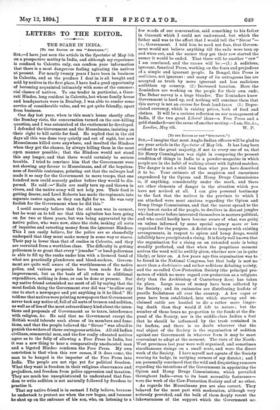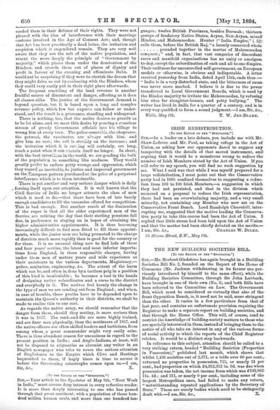[To THE EDITOR OF THE " SPECTATOR." . 1
SIR,—I imagine that most Anglo-Indian officers will be glad to see your article in the Spectator of May 5th. It has long been evident to the great majority, if not to every one of us, that Sir Henry Cunningham was right in comparing the present condition of things in India to a powder-magazine in which people are in the habit of walking about with lighted matches. The danger is not a whit less than what you have described it to be. Your estimate of the suspicion and uneasiness engendered by the Opium and Hemp Drugs Commissions is, if anything, considerably under the mark, and there are other elements of danger in the situation which you have not noticed at all I can give personal testimony to the fact that the natives in the province to which I am attached were most anxious regarding the Opium and Hemp Drugs Commissions, and that the unrest spread to the very lowest ranks of the people, to dwellers in distant jungles who had never before interested themselves in matters political, and who could hardly have become aware of what was going on unless informed by some special agency more or leis organised for the purpose. A decision to tamper with existing arrangements, in respect to opium and hemp drugs, would infallibly have precipitated a rising. It is fairly well known that the organisation for a rising on an extended scale is being steadily perfected, and that when the propitious moment arrives the word will be swiftly given, whether now (as is quite likely), or later on. A few years ago this organisation was to be found in the National Congress, but that body is no no more than a doctrinaire and rather seditious debating society, and the so-called Cow-Protection Society (the principal pro- moters of which no more regard cow-protection as a religious duty than the Archbishop of Canterbury does) has taken its place. Large sums of money have been collected by the Society; and its emissaries are distributing leaflets of puerile foolishness all over the country. A few cages or pens have been established, into which starving and un- claimed cattle are hustled to die a rather more linger- ing death than they would if left to nature ; but the number of these bears no proportion to the funds at the dis- posal of the Society, nor is the middle-class Indian a fool that he should be influenced by the trash contained in its leaflets, and there is no doubt whatever that the real object of the Society is the organisation of sedition against our Government in whatever form it may be most convenient to adopt at the moment. The riots of the North- West provinces last year were well organised, and sometimes simultaneous risings on a small scale, and were the direct work of the Society. I have myself met agents of the Society wearing its badge, in outlying corners of my district ; and I am personally convinced that the wild and disquieting rumours regarding the intentions of the Government in appointing the
Opium and Hemp Drugs Commissions, which prevailed throughout India—even to its least accessible fastnesses—
were the work of the Cow-Protection Society and of no other.
As regards the Massalmans you are also correct. They behaved for the most part with moderation, although very seriously provoked, and the balk of them deeply resent the lukewarmness of the support which the Government ac- , corded them in their defence of their rights. They were not pleased with the idea of interference with their marriage customs involved in the Age of Consent Act; and, though that Act has been practically a dead letter, the irritation and suspicion which it engendered remain. They are very well aware that they are the salt of the native population, and resent the more deeply the principle of "Government by majority," which places them under the domination of the Hindoos, and crowds them out of places of dignity and profit in favour of the cunning and effeminate Babu. It would not be surprising if they were to cherish the dream that they might drive us out by coalescing with the Hindoos, whom they could very easily put in their right place afterwards.
The frequent resettling of the land revenue is another fruitful source of discontent and danger, affecting as it does all classes alike. The justice of the Government demand is beyond question, but it is based upon a long and complex revenue policy, which few but experts can follow or under- stand, and the result is a grievance, standing and widespread.
There is nothing, too, that the native desires so greatly as to be let alone, and we meet this desire by pouring a ceaseless stream of greedy Government officials into hi's' village to wrong him at every turn. The police-constable, the chaprasee, the patwari, the vaccinator, are always with him, and give him no rest; the evil is steathly on the increase ; and the irritation which it is csr...ing will certainly, ere long, reach a point when it can cantain itself no longer. In short, with the best intenttais in the world, we are goading the bulk of the population to something like madness. They would greatly prefer to endure petty wrongs and oppression, which they regard'as inevitable, to justice and improved government on the„European pattern purchased at the price of a perpetual interference which is to them intolerable.
!There is yet another and very serious danger which is daily 'forcing itself upon our attention. It is well known that the Civil Service of India no longer attracts the class of men 7 which it used to do,—that there have been of late barely enough candidates to fill the vacancies offered for competition. This is bad enough. But another result of the diminution of the rupee is that all the older experienced men of the Service are retiring the day that their sterling pensions fall due, in preference to staying on in hopes of obtaining the higher administrative appointments. It is thus becoming increasingly difficult to find men fitted to fill these appoint- ments, while the junior men are being promoted to the charge of districts much more rapidly than is good for the country or for them. It is no unusual thing now to find lads of three and four years' service, the latest and most inferior importa- tions from England, in these responsible charges, having under them men of mature years and wide experience as their assistants in the various departments, Magistracy,— police, sanitation, engineering, &c. The extent of the harm which can be, and often is, done by a tactless prig in a position of this kind is incalculable ; he becomes a tool in the hands of designing native subordinates and a curse to the district and everybody in it. The natives feel keenly the change in the type of men we are sending out from England ; and when, in case of trouble, these youths have to be depended upon to maintain the Queen's authority in their districts, we shall be made to realise this to our cost.
As regards the native army, we should remember that the danger from them, should they mutiny, is more serious than it was in 1857. The rank-and-file are more highly trained, and are finer men physically, than the mutineers of 1857, and the native officers are often skilled leaders and tacticians, from among whom, a great commander might very easily arise. There is thus abundant reason for uneasiness in regard to the
present position in India ; and Anglo-Indians, at least, will not be disposed to stigmatise as alarmist any writer in an English newspaper who tries to rouse the serious attention of Englishmen to the Empire which Clive and Hastings bequeathed to them, if haply there is time to secure it -before the threatening catastrophe comes upon us.—I am,



































 Previous page
Previous page